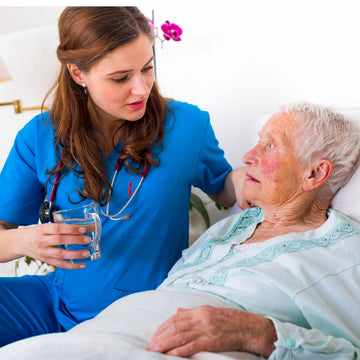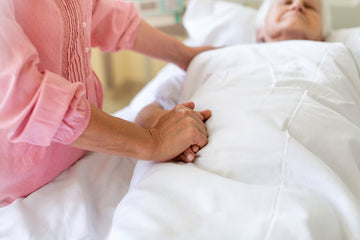Bed Sore Prevention & Treatment: Essential Care Tips for Faster Healing
Jan 04, 2025

Caring for our senior citizens is of paramount importance in our nation, given the significant portion of the population consists of elderly individuals. Their health and well-being demand special consideration due to their advanced age, slower recovery from injuries, and increased vulnerability to illnesses. Their reduced immunity leaves them reliant on others for support and care, particularly when bedridden.
One common issue that arises in such cases is the development of pressure ulcers, also known as bedsores. These sores are prevalent among individuals with limited mobility due to prolonged periods of immobility. They can significantly impact the quality of life for those affected. Bedsores are particularly concerning for patients with chronic or terminal illnesses that confine them to bed, such as cancer patients undergoing treatments and chemotherapy.
Before delving into the topic further, let's take a closer look at bedsores:
What Are Bedsores?
Bedsores, also called pressure sores, develop over time due to continuous pressure or friction on a specific area of the skin. Prolonged pressure or rubbing against the skin, often caused by contact with bedsheets, can lead to skin deterioration. This constant pressure reduces blood supply to the affected area, causing the skin to deteriorate and eventually develop a sore.

Also Read -> Unlocking the Truth About Bedsores
Who Is at Risk of Developing Bedsores?
People with limited mobility are at a higher risk of developing pressure sores. This includes individuals who are bedridden, wheelchair-bound, require assistance to move certain body parts, or have conditions affecting blood flow, like diabetes or vascular issues. Senior citizens are particularly vulnerable.

Recognizing the Symptoms of Bedsore: Stages of Bedsores
The severity of pressure sores can vary, ranging from Stage I, characterized by a reddened and painful area on the skin, to Stage IV, the most severe, which involves damage to muscles, bones, veins, tendons, and even body fat exposure through a hole in the skin. Timely recognition and intervention are crucial in preventing the progression of these sores.
Here are some essential strategies for caring for bedridden individuals or those with bedsores:
How to Prevent Bedsores? – Best Practices & Tips
1. Maintain Fundamental Hygiene and Grooming:
Bedridden or seriously ill patients often have limited mobility, making it essential to assist them with basic hygiene and daily tasks like brushing, bathing, and attending to their needs. Ensuring proper hygiene not only prevents infections but also contributes to their overall well-being.
2. Ensure Good Bed Hygiene:
Since these individuals spend most of their time in bed, maintaining proper bed hygiene is vital. Using clean, dry sheets and regularly changing bed linens is crucial. Adequate ventilation and exposure to sunlight are also essential to prevent issues like bedbugs. Opting for cotton bedsheets or using air mattresses and water beds for comfort can be beneficial in cases of limited movement.
3. Provide Nutritious Food:
A balanced diet and adequate hydration are crucial for individuals with additional health issues. It helps maintain their overall health and vital signs. Follow the doctor's dietary recommendations and monitor their eating habits to ensure they receive the right nutrients in the right amounts.
4. Pressure Relief:
To prevent the formation of pressure sores, use pillows, foam cushions, air mattresses, air/water pads, or other appropriate materials to reduce pressure on susceptible areas. Shifting the patient's position regularly can alleviate strain on these areas. Keeping the wound dry and well-ventilated is essential to prevent its worsening.
5. Best Medical Treatment for Bedsores
Utilizing specialized products like bed sore gel and bedsore treatment ointments can aid in managing and preventing the spread of skin infections. These products help maintain the wound's cleanliness and dryness.
Amaterasu Lifesciences offers innovative solutions to prevent and alleviate discomfort in bedridden individuals. Soreze gel, the nation's first silicone-based bedsore prevention product, creates a breathable and water-repellent barrier on the skin. This barrier reduces friction, maintains skin smoothness, and prevents direct contact of the skin with urine or stool.
Who should use Soreze Gel?
Anyone who spends long hours on bed or wheelchair or have mobility issues or any of the below mentioned conditions are most likely to develop bedsores.
- Stroke/ Paralysis
- Patients on oxygen/ BiPap/ ventilator
- Post-surgical case with limited mobility
- Neuro surgery
- Orthopedic patients on complete bed rest and/or with reduced mobility
- Terminally ill patients e.g. coma, patients on life support systems, etc.
- Long hospitalisation cases
Caring for bedridden individuals or those with bedsores requires attention to detail and specialized products like Soreze Gel to ensure their comfort and well-being.


